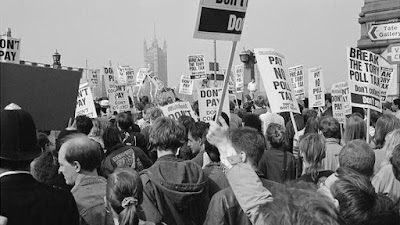When Margaret Thatcher became Prime Minister in May 1979 it marked a break point in British history. She was, of course, the country’s first woman PM, and among the first in Europe. But her election also represented a systematic rejection and reversal of the post war political consensus, where the main parties agreed on the principles of Keynesian economics, the welfare state, a balanced mix of public and private sectors, and close regulation of the economy. The main exception to this was to be the National Health Service.
The 70s was a tough time for Britain, with deep economic and social divisions, a declining industrial base and bad work practices. Rampant inflation, inefficient state-owned companies, government deficits, low investment and worker unrest typified the period. What’s not always realised is that other industrialised countries were hit by a permutation of these same factors. As historian David Priestland says, “It was clear that economies needed to be retooled to take account of a new economic environment. The question was how was this to be achieved.”
The new economy
Thatcher’s 1979 election win followed a minority
Labour government that ended after the ‘winter of discontent’. Official and
wildcat public sector strikes, at their most graphic with coverage of the dead
going unburied, made it seem Britain was ungovernable. Thatcher’s prescription
was theoretically based on the monetarism of Friedrich Hayek - inflation was
caused by too much money in the economy, so the government must control the
money supply via interest rates and financial discipline. Free markets and
privatisation were then added to the recipe.
Hayek and Milton Friedman’s Chicago School ideas were
doing the international rounds. And Britain certainly needed a jolt. But the
fate of erstwhile major industries like cars, ship-building and mining was
sealed even earlier, with some hard decisions postponed against a background of
developing globalisation. It’s worth pointing out it was not just Thatcher
supporters who wanted stricter control of inflation. By 1979 Labour Chancellor
Healey had already adopted some monetarist policies like cutting public
spending and selling the government’s stake in oil company BP.
A common view of Thatcher’s macroeconomic performance
is that things were handled well, but the Major government messed it all up. This is simply untrue. While ‘supply side’ measures and some structural
reforms had a positive impact, her macroeconomic policy was pretty diastrous. High interest rates, an overvalued pound, and a deep recession
caused huge unemployment. By contrast the Major government, says Duncan
Weldon, “eventually stumbled into a macroeconomic framework that appeared to
work.”
Monetarism?
A related ideological misperception is that Thatcher's government was monetarist. In theory maybe, but in practice it was not. 1980’s Medium
Term Financial Strategy guiding policy from 1979 to 1983, had targets to reduce
growth in the money supply. These were overshot, so in 1982 they were revised
upwards, rather moving the goalposts. A broad definition of money known as M3
continued to exceed its target. Public borrowing was kept in check by the balance
sheet ruse of netting off privatisation proceeds. In 1985 money targets were
moved to a narrow range and then quietly dropped completely. Purists rightly claimed
monetarism had been abandoned.
The government did
believe in supply side economics. It intervened to create a free market by
lowering taxes, privatising state industries and restraining the power of trade
unions. The 1984-85 confrontation with the miners’ union (NUM) was the key
trial of strength in this sphere. Scargill’s miners were defeated, a clear
victory for the government. In fact laws to check union power were among a raft
of measures used to improve the economic environment generally. They were
retained by her successor, and later, by the 1997 Blair government.
Boom and bust
Reduced demand in the economy and high unemployment
especially in industrial areas, plus a strong pound, had helped reduce
inflation to 3% by 1986. The government then thought it had slain this dragon
so it could re-heat the economy. Interest rates and taxes were cut, creating
the late 80s boom. But by 1990 inflation had risen to over 10%. It took a new
squeeze and near 15% interest rates to bring it down. Recession, then
unsustainable boom, followed by another recession, is hardly a good record. But
it’s the Thatcher legacy. Stop-go, or boom and bust. And rather against common
wisdom the tax take as a share of GDP remained at around 40% throughout the
period.
The main Thatcher policies were deregulation, privatisation, trade union marginalisation, reduced public spending, tax cuts and moving power from local authorities to central government. Thatcherism, a term barely used by Thatcher herself, was neatly summarised as “the free economy and the strong state”. The wolves often gorged on the sheep. Libertarian in outlook, it relied on a streak of authoritarianism in practice. And liberty was not spread equally. As Isaiah Berlin had remarked “Freedom for the pike is death for the minnows”.
Political salvation
The economic shock to Britain from Thatcher’s election in 1979 was probably necessary. But it was carried out in a socially divisive way. Unemployment grew fast as austerity budgets and high interest rates hit industry hard. But the Thatcher government did much to help the City of London, with a structural shift from industry to finance that Britain is still struggling to manage. In 1982 with 3m jobless and low opinion poll ratings her economic policy was widely criticised publicly and in government. She would probably have lost the 1983 election, other things being equal, but was clearly saved politically by the 1982 Falklands war.
Some think that Thatcher’s economic policies were a
success. While the early jolt was important, psychologically as much as
anything, Britain’s growth rates in the 1980s were scarcely higher than those
of the 70s. They could even have been lower without the windfall from North
Sea oil coming on stream. It’s true that productivity rose by 11% in the
period, mostly due to high unemployment. Compared to countries like Germany, though,
where productivity rose 25% with little industrial or social damage, the UK
figures were disappointing. Indeed the key period of sustained growth
was from 1993 to 2007 under the Major and Blair governments, well after
Thatcher.
Apart from trade union law to free up labour markets,
the only policy to have brought some lasting measure of success is the
privatisation of industries like gas, electricity and telecoms, though clearly
not all have worked out well. It’s a key part of the Thatcher legacy as this model
has been taken up by most countries around the world, including the European
Union. Even France, slow to relinquish state control, is largely on-side.
Housing policy
Against this the council house sell-off had drawbacks
that have now become clear. There are many reasons for today’s acute housing
shortage - demographic change and life expectancy, the rise in single person
households, variable planning rules and rising expectations - but the absence
of a municipal housing supply is crucial. One reason for the ballooning UK welfare
budget is the huge sums the state has to pay to private landlords (including
those who now own a large proportion of the ex-council houses). An astonishing
51% of private tenants in 2020 had their rent paid from benefits.
The housing shortage and other structural problems in
the economy were not so clear during the 1990s and 2000s. The consequences of a
lack of infrastructure investment and an imbalance from an overload of
financial services were largely hidden. It was only in 2008 with the global
financial crisis that the true state of Britain’s economic affairs was evident.
The country was left with a problem legacy. It was a most uncomfortable realisation.
Says Priestland, “The model built by Thatcher was being sustained by debt”.
Thatcher in balance
Some Thatcher plus points. She used shock tactics to
shake the British economy in the 80s, against common wisdom. She took on the
unions to boost the economic supply side, and put Britain in the international
vanguard of deregulation and privatisation. A committed campaigner to stay in
the then EEC in 1975, she was a driver of Europe’s Single Market in the 80s. Firm
in the Falklands crisis and brave when the IRA bombed her hotel during 1984’s
Conservative party conference, she was a strong, driven personality and always
hard working.
Against this her economic policies became inconsistent
and after a dramatic start yielded poor long term results, especially in
housing. She took the credit for successes but blamed others for failures. Not
a consensual figure, she fell out with colleagues like Michael Heseltine, Nigel
Lawson and Geoffrey Howe. She was lucky with her enemies, like miners’ leader Scargill and
Argentina’s Galtieri. She was aggressive, and determined. In her third term she
listened less, and became more truculent in both European and domestic spheres,
pushing a disastrous Poll Tax against advice. Successor John Major later said
she was “a profoundly unconservative” figure with “warrior characteristics”.
It’s been claimed that the advent of the Social
Democrat Party which with its Liberal allies won nearly 25% of the vote in
1983’s election, prevented Labour from gaining power. This is an abiding
fantasy of the left. Detailed analysis has convincingly shown that idea to
be wrong. Tony Blair later wrote “Britain needed the industrial and economic
reforms of the Thatcher period”. Many fair minded people might agree. But the
belief in a property stake shows up badly today, when young people can’t get
their foot on that ladder.







No comments:
Post a Comment